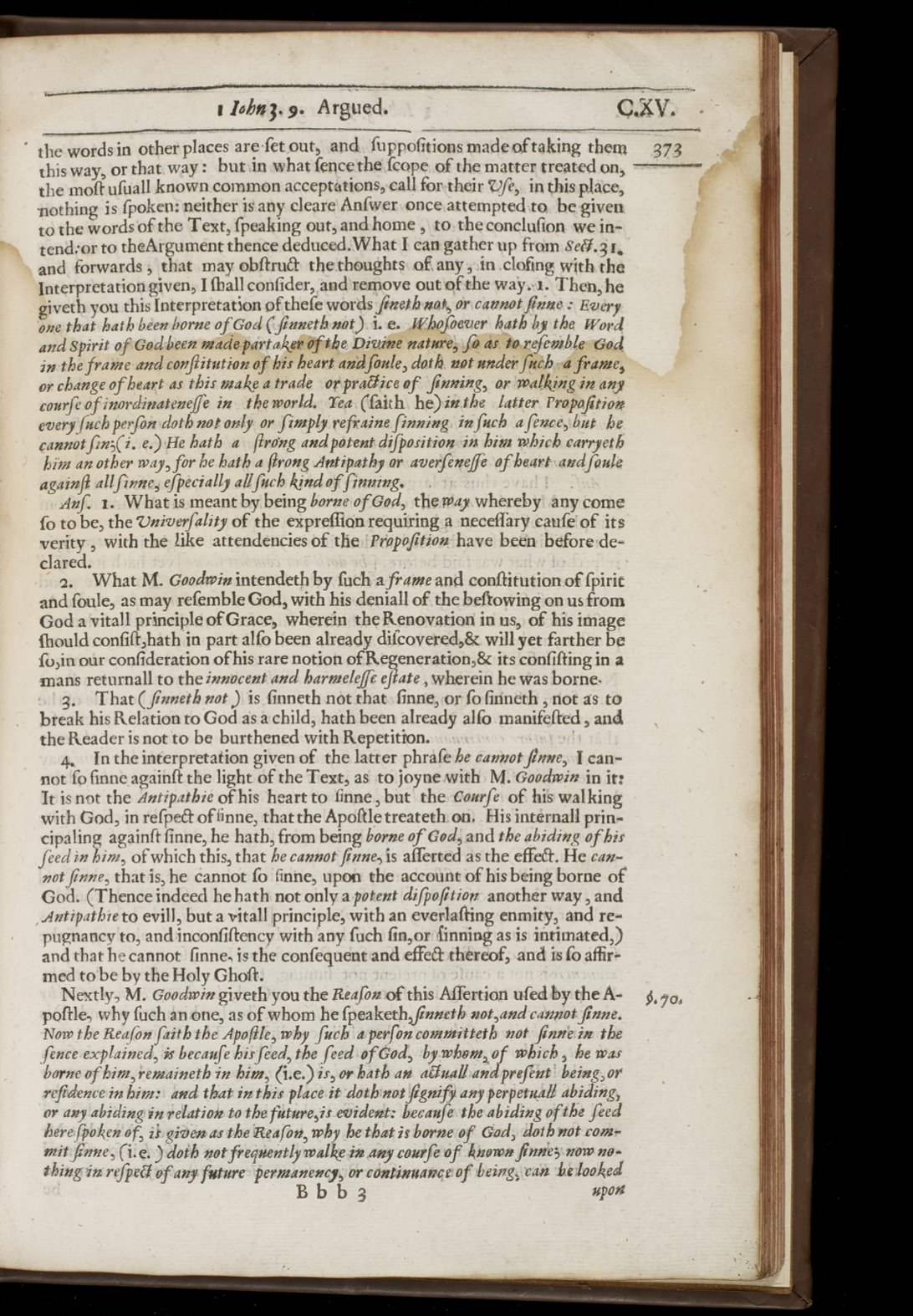

I
Mn;.,.
Argued.
the
words
in
other
places
are let
out,
and
fuppofitions
made
oftaking
them
this way,
or that
way
:
but
in
what
fence
the
fcope
of
the
matter treated on,
the
moil
ufuall
known common acceptations,
call
for their
vfe,
in
this place,
nothing
is
fpoken:
neither
is
any
cleave
Anfwer once,
attempted to be given
to the
words
of
the Text,
fpeaking
out, and
home
,
to the
conclufion we
in-
tend:
or to theArgument thencededuced.What I can gather up
from
seFI.3
t,
and forwards
;
that
may obflru&
the thoughts
of
any
,
in
.clot
ng with
the
Interpretation
given,
I (hall
confider, and
remove out
of
the way. t. Then, he
giveth you this
Interpretation ofthefe
words
f
neth not,
or
cannot
finne
:
Every
one
that
hath
been
borne
of
God
(finneth not)
i.
e.
Whofoever
bath
by
the Word
and
Spirit
of
God
been
made
partaker
of
the
Divine nature,
fo
as to referable God
in
the
frame and
conflitution
of
his
heart antifoule,
dotti.
not under
fuch
a
frame,
or
change
of
heart
as
this
make
a
trade
or
pra
lice
of
finning,
or walking
in
any
courfe
of
inordinateneffë
in
the
world.
Tea
(faith he)
in
the
latter
Propafition
every
filch
perfon doth
not
only or
fimply
re
fraine
finning
in
filch
a
fence, but
he
cannot
fin;(i.
e.)
,He
hath
a firong
and
potent
dif
position
in
him which carryeth
him an other
way,
for
he
hath
a firong Antipathy
or averfeneffe
of
heart
andfouls
againft
all finne;
efpecially
allfach kind
of
f
inning.
Anf.
z.
What
is
meant by being
borne
of
God,
thereat' whereby any come
fo
to be, the
Vniverfality
of
the
exprefhon
requiring
a
neceflary
caufe
of
its
verity
,
with
the like attendencies
of
the
Propofition
have been before de-
clared.
2.
What
M.
Goodwin
intendeth by
fuch
a
frame and conflitution
of
fpirit
and
foule,
as
may refemble
God, with
his denial!
of
the
befìowing
onus
from
God
a
vitali
principle
of
Grace, wherein
the Renovation
in
us,
of
his
image
should confifl,hath
in
part
alto been already difcovered,& will
yet farther be
fo,in our
confideration
ofhis
rare notion
of
Regeneration,&
its confifling
in
a
mans returnall
to
the
innocent
and
harmeleffc
of
ate
,
wherein he
was
borne.
3.
That(
finneth
not)
is finneth
not
that
finne,
or
fo
finneth
,
not
as
to
break
his
Relation to God
as a
child,
bath
been already
alfo manife'fled
, and
the Reader
is
not
to
be burthened with Repetition.
q
In the interpretation
given
of
the latter
phrafe
he
cannot
finne, I can-
not
£Q
finne,againflthe light
of
the
Text,
as
to
joyne with
M. Goodwin
in
it:
It
is
not the
Antipathie
of
his
heart to
finne
,
but the
courfe
of
his
walking
with God, inrefpe&offinne,
that the
Apontetreateth.on,
His
internal!
prin-
cipaling againft
finne,
he
bath,
from being
borne
of
God,
and
the abiding
of
his
feed
in him,
of
which this,
that
he
cannot
finne,
is
afferted
as
the
effe&.
He
can-
not
finne,
that
is,
he
cannot
fo finne,
upon
the account
of
his
being borne
of
God.
(Thence indeed
he
bath not
only
a
potent difpafition
another
way,
and
Antipathie
to
evil!,
but
a vital!;
principle, with
an everlafling
enmity:
and
re-
pugnancy
to, and
incontinency with any
fuch
fin
or tinning
as is
intimated,)
and
that hecannot
finne,
is
the confequent and
effe&
thereof, and
is
fo affir-
med
to
be by the Holy Ghoft.
Nextly,
M.
Goodwin
giveth you
the
Reafon
of
this Affertion ufed
by the
A-
poflle,
why fuch
an
one,
as
of
whom he fpeaketh,finneth not,and
cannot
finne.
Now
the Reafon
faith
the
Apo
file,
why
filch
a
perfon
committeth not
finne
in
the
fence explained,
is
becaufe
his
feed,
the
feed
o
f
God,
by
whom,,of which ,
he
was
borne
of
him,remaineth
in
him,
(i.e.)
is,
or
bath an a/luall and
prefent being;
or
reftdence
inhim: and
that in this
place
it
doth not
fignify
any perpetual)
abiding,
or
any
abiding
in
relation
to
the
future,is evident:
becaufe
the
abiding
of
the
feed
her
(Oaken
o
f,
ii
given
as
the
Rea
fon,
wh he
that
is borne
of
God,
cloth
not
com-
mit finne,
(i.e.
)cloth
notfrequentlywalks
tir
in.anny
courfe
of
l
nown,
fm e'
now
no-
thing
in
refpeef
of
any
future
permanency, orcontinuance
of
being,
can
fee
.looked
Pbb3
upon
373










